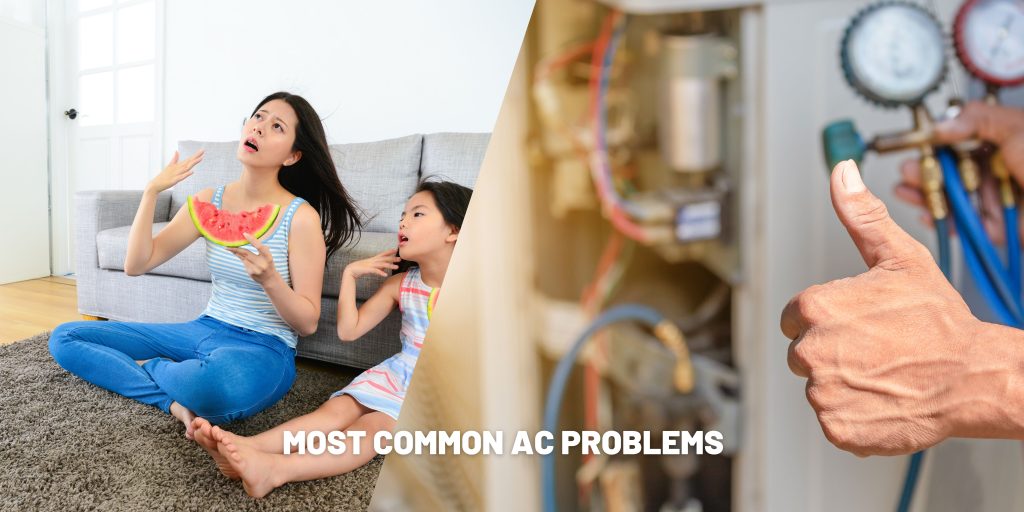Common Air Conditioner Problems and How to Fix Them

most common ac problems
As the summer heat intensifies, a well-functioning air conditioner becomes essential for comfort. However, even the best AC systems can encounter problems over time. Understanding common air conditioner issues and how to address them can save you time, money, and discomfort. In this article, we explore some of the most frequent AC problems and provide practical solutions to fix them.
1. AC Not Blowing Cold Air
One of the most common air conditioner problems is when the unit stops blowing cold air. This issue can stem from various causes, such as a dirty air filter, low refrigerant levels, or a malfunctioning compressor. To troubleshoot, start by checking and replacing the air filter if it’s dirty or clogged. A clean filter can significantly improve airflow and cooling efficiency. If the problem persists, inspect the refrigerant levels. Low refrigerant often indicates a leak, which requires professional repair. Additionally, ensure that the thermostat is set to the correct temperature and mode. If these steps don’t resolve the issue, it might be time to call an HVAC technician to examine the compressor and other internal components.
2. AC Leaking Water
Water leakage is another common issue that can occur in air conditioning systems. This problem usually arises from a clogged condensate drain line or a malfunctioning pump. When the drain line is blocked, the water extracted from the air can’t properly exit the unit, leading to overflow. To fix this, first, locate the drain line and clear any obstructions using a wet/dry vacuum or a plumber’s snake. Regularly flushing the drain line with a mixture of water and vinegar can also help prevent future clogs. If the pump is at fault, you might need to replace it. Additionally, ensure that the unit is properly leveled, as an uneven installation can cause water to pool and leak.
3. Strange Noises from the AC
Unusual noises coming from your air conditioner can be alarming. These sounds often indicate underlying issues that need attention. Common noises include buzzing, rattling, and squealing. A buzzing noise might be caused by electrical problems, such as a loose wire or a failing capacitor. In this case, it’s best to turn off the unit and consult a professional to avoid electrical hazards. Rattling sounds usually point to loose parts or debris within the system. Inspect the unit for any loose screws, panels, or foreign objects, and tighten or remove them as needed. Squealing noises often signal a worn-out or misaligned belt. While some belts can be adjusted, others may need replacement. Regular maintenance can help identify and address these issues before they lead to more significant problems.
4. AC Constantly Cycling On and Off
An air conditioner that frequently cycles on and off can be both annoying and inefficient. This issue, known as short cycling, can result from various factors, including an oversized AC unit, a faulty thermostat, or low refrigerant levels. An oversized unit cools the space too quickly, causing it to shut off before the entire home reaches the desired temperature. To fix this, consult an HVAC professional to evaluate your system and recommend the appropriate unit size for your home. A malfunctioning thermostat might also be the culprit. Ensure that the thermostat is correctly calibrated and placed away from direct sunlight or heat sources. If the problem is due to low refrigerant, a technician will need to repair the leak and recharge the system. Regular maintenance checks can help prevent short cycling by ensuring all components function correctly and efficiently.
Conclusion
Understanding common air conditioner problems and how to fix them is crucial for maintaining a comfortable and efficient home during the hot summer months. Regular maintenance, such as cleaning or replacing air filters, inspecting and unclogging drain lines, and addressing unusual noises promptly, can prevent minor issues from escalating into costly repairs. Additionally, consulting an HVAC professional for regular check-ups and any persistent problems ensures your AC unit remains in top condition. By staying proactive and informed, you can enjoy a cool and comfortable home all summer long.



